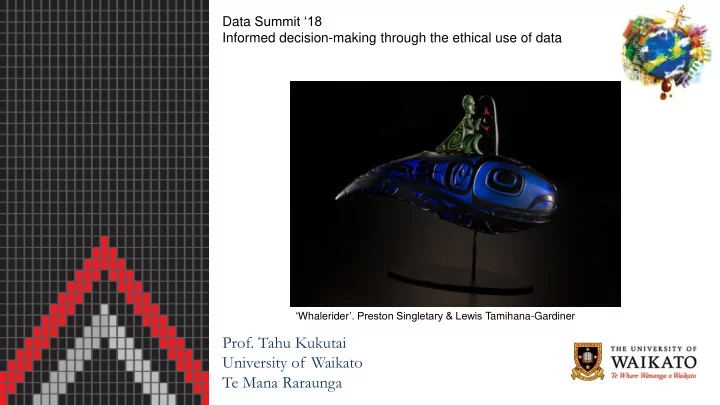

Data Summit ‘18 Informed decision-making through the ethical use of data Māori Data Sovereignty: Tikanga in Technology ‘ Whalerider ’. Preston Singletary & Lewis Tamihana-Gardiner Prof. Tahu Kukutai University of Waikato Te Mana Raraunga
WHOSE DATA Whose ethics Wh Whose ose dec decis ision ions
Data Sovereignty states that data is subject to the laws of the nation within which it is stored Indigenous Data Sovereignty states Indigenous that data is subject to the laws of the nation from which it is collected Data (including Tribal nations) Sovereignty Māori Data Sovereignty refers to the inherent rights and interests that Māori have in relation to the collection, ownership, and application of Māori data.
Advocating for the development of capacity and capability across the Māori data ecosystem including: ‐ Data rights and interests ‐ Data governance ‐ Data storage and security ‐ Data access and control @MaoridDSov http://www.temanararaunga.maori.nz/
Māori data refers to information or knowledge in a digital or digitisable form that is about or from Māori peoples and our environments, regardless of who controls it. Data from Māori (self -generated) Eg. Māori/iwi organisations and businesses What are Māori Data? Data about Māori (generated by others) Eg. IDI Data about Māori resources (self and/or others) Eg . Māori land
is a key mechanism for enabling self-determination and innovation is concerned with protecting Iwi/Māori rights of access to data participation in data integration activities partnership in the governance and/or ownership of data (TeTiriti is foundational) Māori Data Sovereignty recognises that Māori data should be subject to Māori governance 1. Data for Governance Access and Use to transform the lives of Māori 2. Governance of Data Governance and Control to ensure the data is relevant and responsive
Control serves rights DATA GOVERNANCE OPPORTUNITIES TRIBAL REGISTERS LOW CONTROL HIGH CONTROL
Control. Māori have an inherent right to exercise control over Māori data and Māori data ecosystems. This includes Data from a but is not limited to data creation, development, Māori stewardship, analysis, dissemination and infrastructure. worldview: Jurisdiction. Decisions about the physical and virtual storage of Māori data should enhance control for current Rangatiratanga and future generations. Whenever possible, Māori data | Authority should be stored in Aotearoa NZ Self-determination. Māori have the right to data that is relevant and empowers sustainable self-determination and effective self-governance.
Stewardship . Maori data needs to be stored and Data from a transferred in such a way that it enables and reinforces the Māori capacity of Māori to exercise kaitiakitanga over Māori data . worldview: Restrictions. Māori should decide which Māori data sets should be controlled (tapu) or open (noa) access. Kaitiakitanga | Guardianship Ethics . Tikanga, kawa (protocols) and mātauranga Māori (knowledge) should underpin the protection, access and use of Māori data.
Data from a Respect. The collection, use and interpretation of Māori data should uphold the intrinsic dignity of Māori worldview: individual, groups and communities. Consent. Free, prior and informed consent should Manaakitanga underpin the collection and use of all data from or | Reciprocity about Māori. Less defined types of consent must be balanced by stronger governance arrangements.
Māori Data Sovereignty
Data Summit’18 Prof. Tahu Kukutai National Institute of Demographic and Economic Analysis Te Mana Raraunga
Recommend
More recommend